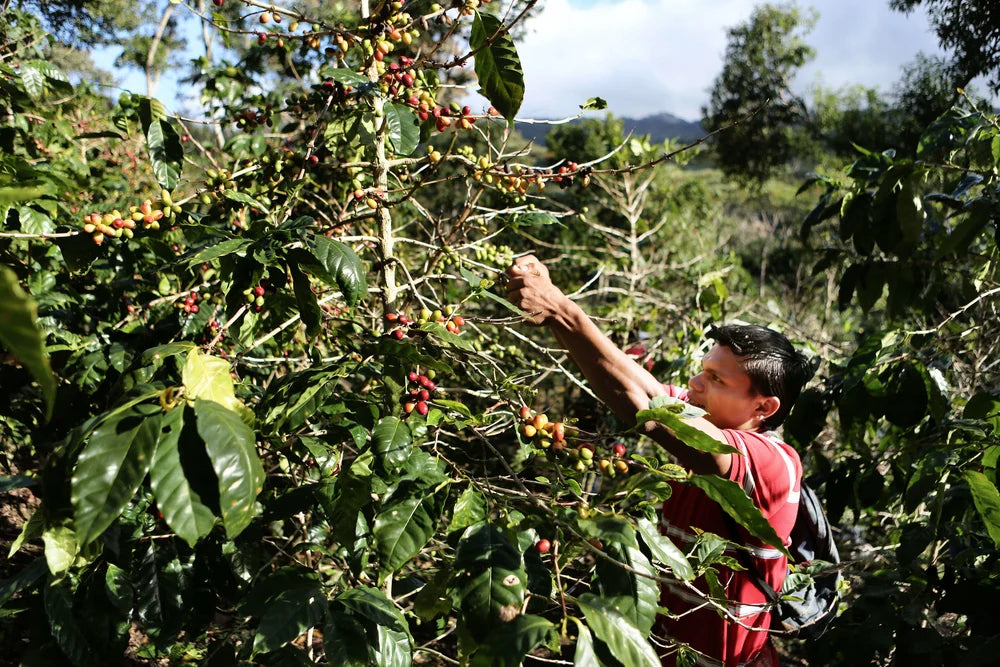
Founder's Select: Nicaragua Selva Negra Honey Process
Share
Our Founder’s Select line is where we set aside coffees that are truly extraordinary—lots that stand out for their flavor, craftsmanship, and story. These are coffees that require extra effort and care, and because of that, they deserve their own stage. They’re not just about exceptional taste, but also about honoring the people and places that make them possible.
This new release from Selva Negra in Matagalpa, Nicaragua is one of those coffees. Medium roasted to highlight its sweetness and balance, it opens with comforting layers of dark chocolate, brown sugar, caramel, and almond. What makes it shine is the honey process, a method that leaves part of the cherry’s sticky fruit on the bean as it dries, creating a cup that is rich, layered, and naturally sweet with a silky finish.
The Sweet Touch of the Honey Process
For many coffee drinkers, the terms washed and natural are familiar. The washed process creates clean, crisp cups by fully removing the coffee fruit before drying, while the natural process leaves the whole cherry intact, producing fruit-forward and sometimes wild flavors. The honey process, however, is a fascinating middle ground.
After harvesting, the outer skin of the coffee cherry is removed, but instead of washing away the sticky, golden mucilage layer, part of it is left clinging to the bean as it dries. This sugary coating looks a bit like honey—hence the name—and it acts like a natural flavor enhancer. During drying, the sugars caramelize and sink into the bean, creating a cup that carries the clarity of washed coffees alongside the richness and sweetness of naturals.
A Farm That Feels Like a Living Story
Beyond the cup is La Hammonia, the name of the coffee farm at the heart of Selva Negra. Once upon a time, in the late 1800s, wandering Germans intended to press north to California to try their luck in the gold rush—but they paused their journey in Nicaragua and decided to stay. They fell in love with its mountain air, friendly communities, and planted seeds—literal and cultural—on volcanic slopes.
In 1974, descendants Eddy and Mausi Kühl returned and breathed new life into the land—restoring La Hammonia, opening an ecolodge, and calling the estate Selva Negra, a salute to their family's Black Forest roots. Then, after the civil conflict forced them away, they came back in 1990 with a vision: nurturing a farm that could thrive in harmony with nature. Within a few years, the estate had reimagined itself—one-third untouched forest, one-third shaded coffee, the rest in organic farming and grazing pastures.
Life On the Farm in Living Color
La Hammonia is not just a coffee farm; it's a vibrant community. About 300 employees and their families live on the farm in sturdy concrete homes with tiled floors, kitchens, and clean cookstoves, while shared systems recycle water and even generate methane gas for cooking before irrigating fruit trees. Children attend the on-site elementary school, supported by donors and the farm itself, with top students sponsored to continue their studies in Matagalpa, while others move on to local public schools or join the farm team. Healthcare is provided through an on-site clinic run by a full-time nurse—herself born and raised on the farm—where essential medicines are subsidized or donated. Beyond the basics, the community enjoys its own baseball fields, music rooted in a Polish-Latin blend, a drumline, and the freedom to fish in the farm’s ponds, creating a vibrant culture that makes La Hammonia as much a home as a workplace.
Why This Coffee Is More Than a Cup
Our Founder’s Select: Nicaragua Selva Negra Honey Process isn't just about luscious flavors—it’s about tasting a story. Each sip is soaked in tradition, innovation, and care. It’s a nod to family roots, a tip of the hat to the forest, and a promise that coffee can be kind—to people and planet alike.
Read more about the farm and its history at https://www.lahammonia.com/
